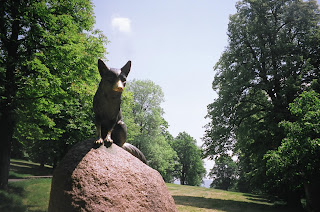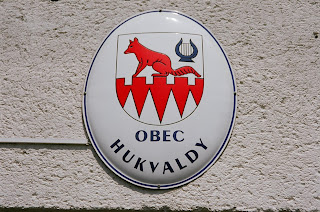Jiri (pronounced 'Yizhi' - I can't do the accent over the 'r') Belohlavek's second BBCSO concert, if anything, surpassed the first (see 'A new season') in terms of perfect programming and lively execution. The novelty was a long-abandoned piece by Zemlinsky, Waldgesprache, extending the Eichendorff poem about the Lorelei into a ten-minute scena for soprano and orchestra. Camilla Tilling brought it all splendidly to life (with a chilling 'du bist die Hexe Lorelei!') and handled the child-heaven song at the end of Mahler 4 with great skill (she couldn't do all the long phrases in one breath, but broke them up intelligently). The voice has great amplitude for a lyric soprano: my friend Isabel wondered whether she'd soon edge into Wagnerian territory - Elsa, Elisabeth, possibly Sieglinde?
BBC Messageboarders have been unbelievably negative about Belohlavek's Bruckner 7, bewailing sub-amateur execution: where and how? There were a few squeaks and pops in the Mahler, but only because he asked so much in terms of colour and articulation from the wind and the (smallish) brass section. Haydn's misnamed Miracle Symphony, No. 96, was a delight - so fresh, lilting and original. There seems to be a ?new? co-principal oboist to share with the wonderful Richard Simpson; this chap, David Powell, did playful things with the trio of the minuet. Things to hear before I die: all the Haydn symphonies and quartets, all the Bach cantatas. If I didn't spend my time listening to so much, I'd play a different Bach cantata every morning after breakfast. Isabel talks of getting us together as a small choir with a small orchestra - we know a few folk on the early music scene - and working our way through them for pure pleasure.
Lively crowd for the pre-performance talk, much more fun in the Fountain Room than the Barbican's concert hall, where the lights glare and you can't see the punters' faces. I started by freewheeling from Bruckner to Mahler via Wagner, Bellini and Haydn, and talking about the different uses of the 'gruppetto' (think Brunnhilde's theme or the big tune in the Rienzi Overture). Then I went back over some of the ground covered with the Morley students on Thursday evening - song into symphony, how every symphony looks back to the one before it and forward to the next, each a chapter in an exceptionally voluminous autobiography. After the concert, 'Yizhi' talked to Ann McKay - maybe his lack of idiomatic English makes him sound a little boring at times, which he certainly isn't as a conductor; I had the same experience when I interviewed him for Gramophone some years back.
His most interesting remark was to claim Mahler as a Czech composer which, being born in Jihlava/Iglau he no doubt is. Looking forward to another excursion in 'Czechia' with our lovely Viennese friends Tommi and Martha on the Mahler trail. Earlier this year, at the end of May, they drove us around Janacek country - Brno, Luhacovice and Hukvaldy. The last-named, the village where Janacek was born and died, is rich in atmosphere, and there's a statue of Bystrouska, the heroine of that evergreen masterpiece The Cunning Little Vixen , dedicated by the local huntsmen. It stands on the edge of the forest in the castle park where Janacek walked and absorbed the wood magic for his music.

And here's the local insignia:

No comments:
Post a Comment